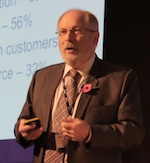 Since taking the helm as Managing Director of Cheltenham-based Total in May this year Lorrin White has not only put the company on a new strategic path, she has introduced fresh perspectives and a sense of determination that filters through to all levels of the business.
Since taking the helm as Managing Director of Cheltenham-based Total in May this year Lorrin White has not only put the company on a new strategic path, she has introduced fresh perspectives and a sense of determination that filters through to all levels of the business.
White assumed the role of Managing Director following a 12 year stint overseeing the operational side of the business, seven years as a Director. She took over from Stuart Baikie who mainly helmed the company since it was established in 1998. Her promotion signalled a new era for Total based, in large part, on the fresh perspectives she brings to the role. "It was time to take another look at the business," she said. "A task much easier to perform from the helm rather than the hull."
White's experience within Total and externally in a coaching, mentoring and strategic consultancy capacity is being put to good use as she advances new ideas on team development. "I know most of the team very well," she added. "As leaders, it is our responsibility to nurture people and prepare them for their own future success."
White's involvement in an executive training group has enabled her to recognise her personal aspirations as well as what she wants to achieve in the workplace. "This process has redefined the way I want to work with others," she added. "To that end, my own individual approach to running Total has resulted in the development of a strong plan with full staff involvement, and, more importantly, real buy-in."
A root and branch business review, from mission and vision to rewriting the next three year plan, has also been a priority for White. She has overseen the expansion of Total's Focus wholesale channel with the addition of two new tiers, and called it Focus 360. The initiative opens up the programme to smaller resellers or dealers looking to enter the mobile market, and those requiring a higher level of initial/ongoing support in areas such as proposals, sales support, commercial, billing, technical and marketing. "Our partners are able to move from one level to the other without penalty as their experience and customer base grows," White added.
"The expansion of the programme was borne out of an idea brought to us by some old hands in the industry, Andrew and Paul Fletcher, who have since joined the team and are leading the charge with the growth of this channel expansion which provides two further access points for businesses wishing to enter the mobile market."
Total's Managed Partner Programme offers a path for mobile dealers seeking to become resellers, or resellers in need of billing, technical and marketing support. The Focus 360 Partner Programme is designed for existing mobile resellers with their own billing platform and is tailor-made to support the areas of their business to help them grow, from proposals and analysis to sales and commercial support.
"The 360 proposition fully complements our existing Focus channel," noted White. "This is about collaboration and growth for all stakeholders and we want our partners to succeed. In its first six months the 360 programme is already hitting and exceeding its forecast numbers."
The most common talking point when introducing new partners to Focus 360, meeting new customers or recruiting prospective employees is about wanting to work with like-minded people. "We are sold on this belief," added White. "But our interpretation of partnership extends further than just the telecoms sector and industry suppliers. For Total, partnership is the status of a relationship that exists with all the people we work with, in particular our customers and employees."
It is easy to claim the importance of people and partnerships, but at Total this really does form the basis for how it does business, pointed out White. "Our ethos has always been about communicating and caring, and we have delivered this to a certain extent," she added. "But it is only more recently that we have truly started to understand the needs of our people internally. Staff happiness is inextricably linked with business performance."
Total has recruited six additional staff with several coming into brand new roles. Some of these will be involved in its newly framed strategic support team. "We have a clear vision of success which will mean transforming certain parts of the business and there will be more changes at Total in the coming 12 months as we transition," explained White. "This will involve our brand, our position in the industry, innovative software development and some unique partnerships."
White has not been distracted by the fact that she is a woman operating in a traditionally male dominated sector. Instead, she has been spurred by the minority position of women leaders. "If anything, this demographic has encouraged me to develop my career in an industry where I will stand out," she commented. "In terms of what I believe women can bring to technology and telecoms, it is more a case of showing others what is achievable. Women don't necessarily bring anything different to the table. Whatever their gender, everyone has their own individual skill set and attributes.
"While perceptions and even acceptance of women in senior roles can vary greatly, it shouldn't be a reason or excuse to limit your ambitions. My placement in this role is my chance to show other women in the industry that it is actually about what you do."

 There was a time when drum riffs and door knocks rang loudly in Mark Furness' ears during the working hours. These days, the CEO of essensys is beating the drum about a sound business proposition based on big advances in user self-service and automation.
There was a time when drum riffs and door knocks rang loudly in Mark Furness' ears during the working hours. These days, the CEO of essensys is beating the drum about a sound business proposition based on big advances in user self-service and automation. Here we look at how Toshiba reseller partner Excell upgrades and manages self storage company Big Yellow Group's extensive comms infrastructure.
Here we look at how Toshiba reseller partner Excell upgrades and manages self storage company Big Yellow Group's extensive comms infrastructure. In February 2014 wholesale comms provider Entanet received an initial investment boost to the tune of £6 million from mid-market equity investor Mobeus Equity Partners to support the £14 million management buyout led by new CEO Elsa Chen. Here, Chen provides an update on developments so far.
In February 2014 wholesale comms provider Entanet received an initial investment boost to the tune of £6 million from mid-market equity investor Mobeus Equity Partners to support the £14 million management buyout led by new CEO Elsa Chen. Here, Chen provides an update on developments so far. MyPhones.com Managing Director Dr Stuart Marsden has forged a course that nudges the boundaries of what's technically possible, and his latest triumph could set a new standard for hosted comms platforms.
MyPhones.com Managing Director Dr Stuart Marsden has forged a course that nudges the boundaries of what's technically possible, and his latest triumph could set a new standard for hosted comms platforms. Graham Harris, Product Director for Cloud at Daisy Wholesale, discusses the newly Christened Age of Virtual Hosted Desktops, why the BYOD market will be blown wide open and why now is the perfect time for resellers to capitalise on cloud-based opportunities.
Graham Harris, Product Director for Cloud at Daisy Wholesale, discusses the newly Christened Age of Virtual Hosted Desktops, why the BYOD market will be blown wide open and why now is the perfect time for resellers to capitalise on cloud-based opportunities. Businesses are still stuck on 'old world' thinking when addressing security issues. Cloud is different, it requires a seamless approach to security and risk management that understands and manages the new virtual perimeter, according to Garry Sidaway, Global Director for Security Strategy, NTT Com Security (formerly known as Integralis).
Businesses are still stuck on 'old world' thinking when addressing security issues. Cloud is different, it requires a seamless approach to security and risk management that understands and manages the new virtual perimeter, according to Garry Sidaway, Global Director for Security Strategy, NTT Com Security (formerly known as Integralis). After three decades in the channel Oak has positioned itself as the prominent provider of call logging and call recording solutions for resellers serving SME customers, but the company is now expanding into the mid-market with what Joint CEO Philip Reynolds describes as 'the big one'.
After three decades in the channel Oak has positioned itself as the prominent provider of call logging and call recording solutions for resellers serving SME customers, but the company is now expanding into the mid-market with what Joint CEO Philip Reynolds describes as 'the big one'. Building sites were once the stomping ground for Darren Boyce, CEO of Proximity Communications, so it's no surprise that he's laid firm foundations for one of the comms industry's highest risers.
Building sites were once the stomping ground for Darren Boyce, CEO of Proximity Communications, so it's no surprise that he's laid firm foundations for one of the comms industry's highest risers. This year Comms Vision explores the impact of the Digital revolution and how it is transforming the comms channel. Such 'Change is Good', writes Content Director John Chapman, who outlines the many ways in which this industry-leading event has tracked change, and helped delegates to chart a new course for their businesses through strategic change management.
This year Comms Vision explores the impact of the Digital revolution and how it is transforming the comms channel. Such 'Change is Good', writes Content Director John Chapman, who outlines the many ways in which this industry-leading event has tracked change, and helped delegates to chart a new course for their businesses through strategic change management.